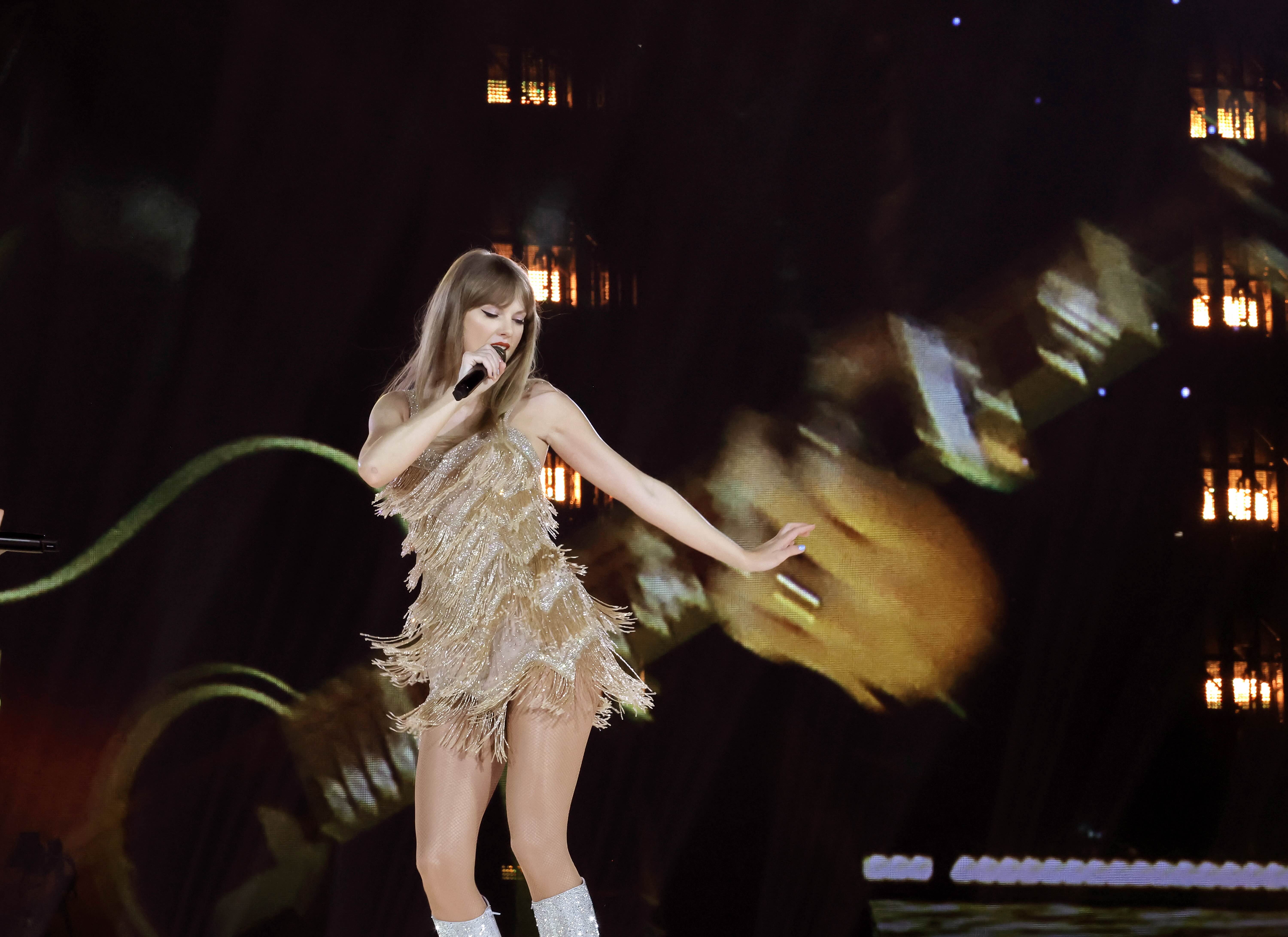
‘Fearless’: How Taylor Swift is owning her narrative

From her teenage crushes to her feuds, Taylor Swift has been using confession, testimony and narrative to shape the public story of her life
Published 8 February 2024
Taylor Swift is renowned for her autobiographical songwriting style. Her lyrics feature her friends, lovers, enemies, frenemies and partners.
And her fans love her for the personal stories of heartbreak, joy and revenge she includes in each and every song.
She is one of many celebrities telling their stories in their own words – it’s powerful because, at our core, human beings are interested in other human beings.
If we look at the hottest-selling books of 2023, memoirs led the charge with Prince Harry’s Spare selling over 3.2 million copies and two million copies of Britney Spears’ The Woman in Me being sold globally (albeit written with the aid of talented ghostwriters).
The concept of a person owning or reclaiming the narrative of their life, from the painful and shameful to the triumphant and joyful, has become a focal point of twenty-first-century culture.

From her early albums documenting teenage crushes to her Reputation-era dish on her feud with Kim-ye, Taylor Swift has been using confession, testimony, and narrative justice to shape the public story of her life.
Her songs are known for the use of what life-writing scholars, Sidonie Smith and Julia Watson, call the autobiographical “I” (“It’s me, hi, I’m the problem, it’s me”).
Whether her fans think they know exactly who and what experience she is writing about, or whether certain lyrical images from her songs remain mysterious, Swift is widely understood as a woman who writes from life.
Plath’s progeny? taylor swift as a confessional poet
The first autobiography in history is widely agreed to be Confessions by Augustine de Hippo, written sometime between 397 and 400 CE.
Polish life writing scholar, Matzgorzata Czerminska,has noted a long tradition of autobiography belonging to the masculine, long after Augustine’s and even Rousseau’s Confessions.

It wasn’t until the late 1950s, 1960s, and 1970s that a surge of women’s voices were heard across genres – like poetry, memoir and song.
The confessional poets — Anne Sexton, Adrienne Rich, Elizabeth Bishop and, of course, Sylvia Plath — were an important part of this chorus of interior lives.
In recent years, academics have particularly linked Taylor Swift’s work with Plath. With themes of mental health, broken-heartedness and death, there are many similarities in their work.
While scholars teaching Swift Studies courses at NYU, Ghent University and Berklee College have been making this comparison for some years now, some critics disagree that Taylor Swift should be called a poet.

This reluctance could be due to the sheer popularity of Swift’s work and her reputation for having an audience of mostly teenage girls. Or it could be that the subject matter isn’t considered ‘serious’ enough at first glance.
The American poet, Jane Hirshfield, has said that the purpose of the lyric in poetry “is in part memorability – it is a way to keep in place by musical patterns and interesting words what might otherwise escape holding”.
If we take Hirschfield’s understanding of lyrical poetry, Taylor Swift’s body of work certainly qualifies. Traditionally Taylor Swift uses the theme of confession in relation to the object of her love, someone she is often engaged in a game of cat-and-mouse with.
Take the 2019 single ‘Cruel Summer’ for example:
And I screamed for whatever it’s worth / “I love you, ain’t that the worst thing you ever heard?”
Swift also uses confession to reflect on her own flaws and foibles, notably in Midnights’ ‘Anti-hero’:
‘I’ll stare directly at the sun but never in the mirror / it must be exhausting always rooting for the anti-hero’

“i remember it all too well”: taylor’s testimony
It’s not just break ups and boyfriends she writes about, either.
Swift’s discography is brimming with confessions about her inner and outer life. The comparisons to the confessional poets might hold water, after all.
From her grandparents’ courtship in 1944 in ‘Timeless’, to her experience of her mother Andrea’s struggle with cancer in ‘Soon You’ll Get Better’, Swift has left an official record of life events in her songs.
This use of life writing in her songs has earned Taylor Swift derision and admiration in equal measure.

Early in her career the media coverage of her tendency to reference her personal life was ridiculed, but we have seen a shift in the framing of such coverage, particularly after the cross-over appeal of Swift’s recent, stripped-back albums Folklore and Evermore.
A curious phenomenon has emerged with Taylor’s Versions, too. That of the relitigation of her previous relationships.
When Red (Taylor’s Version) was released in 2021, her ex-boyfriend from the Red era, Jake Gyllenhaal, was hounded by Swifties. Almost a decade on from the 2012 release of Red – the new recording meant Swift’s fans once again felt her pain and it enraged them.
In what is widely presumed to be the seminal Gyllenhaal break-up song, ‘All Too Well’, was updated to a 10-minute long Taylor’s Version, complete with never-before-heard lyrics referencing the love interest’s ‘F*ck the Patriarchy’ keyring and new recollections of his alleged psychological games.
‘And all I felt was shame / and you held my lifeless frame

Swift’s 2021 testimony of one of her first heartbreaks so stirred her fans that ahead of the release of Speak Now (Taylor’s Version) she implored them not to cyberbully her exes, in an attempt to save John Mayer, widely believed to be the subject of ‘Dear John’, from Gyllenhaal’s fate.
On narrative justice and “dressing for revenge”
From taking aim at record execs and ex-boyfriends, Taylor Swift has certainly embraced American author Anne Lamott’s oft-quoted utterance that “if people wanted you to write warmly about them, they should have behaved better”.
We can’t venture into revenge territory without talking about the interpersonal conflict that still keeps Swift up at night – Swift vs. Kim-ye.
In her songs, Swift has referenced the feud numerous times, including in her 2017 comeback album Reputation. In particular, ‘Look What You Made Me Do’ targeted West:
I don’t like your little games / Don’t like your tilted stage / The role you made me play of the fool / No, I don’t like you.
In ‘Vigilante Shit’, Swift’s narrator urges the listener to “draw the cat eye, sharp enough to kill a man,” and warns potential foes:
I don’t start it but I can tell you how it ends / Don’t get sad, get even
Here, Swift is aligning herself with a long line of female singer-songwriters, from Carly Simon to Alanis Morrisette, who have channelled the deep-seated and collective anger that women can feel from being mistreated in patriarchal societies.

Taylor Swift is a pop star who has used her life experiences in her songwriting to shape her public story. Her autobiographical songs have also earned her a large fortune, particularly since Taylor’s Versions.
If her discography tells her story, she is a life writer who quite literally owns her life narrative.
Swiftposium is an academic conference for scholars discussing the impact of Taylor Swift. It runs at the University of Melbourne from 11-13 February 2024 with public events on Sunday 11 February and recordings of the keynote presentations available online after the conference.
Banner: Taylor Swift performing her ‘Fearless Era’ in Buenos Aires / Getty Image
